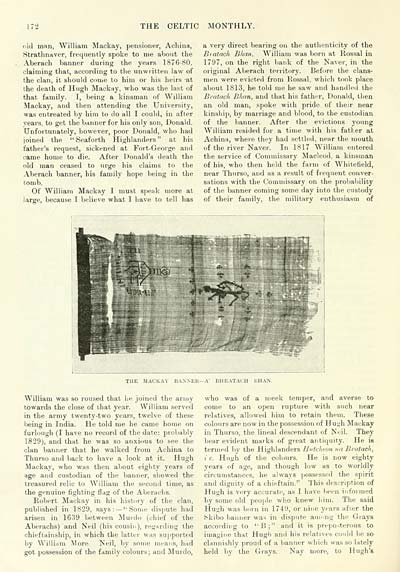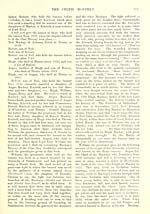Blair Collection > Celtic monthly > Volume 6, 1898
(248)
Download files
Complete book:
Individual page:
Thumbnail gallery: Grid view | List view

72
THE CELTIC MONTHLY.
old man, William Mackay, pensioner, Acliina,
Stratlinaver, frequently spoke to me about the
Aberach banner during the years 1876 80.
claiming that, according to the unwritten law of
the clan, it should conie to him or his heirs at
the death of Hugh Mackay, who was the last of
that family. I, being a kinsman of William
Mackay, and then attending the University,
was entreated by him to do all I could, in after
years, to get the banner for his only son, Donald.
Unfortunately, however, poor Donald, who had
joined the " Seaforth Highlanders" at his
father's request, sickened at Fort-George and
came home to die. After Donald's death the
old man ceased to urge his claims to the
Aberach banner, his family hope being in the
tomb.
Of William Mackay I must speak more at
large, because T believe what I have to tell has
a very direct bearing on the authenticity of the
Biatadi BItan. William was born at Rossal in
1797, on the right bank of the Naver, in the
original Aberach territory. Before the clans-
men were evicted from Rossal, which took place
about 1813, he told me he saw and handled the
Brataclt Blian, and that his fatln-r, Donald, then
an old man, spoke with pride of their near
kinship, by marriage and blood, to the custodian
of the banner. After the evictions young
William resided for a time with his father at
Achina, where they had settled, near the mouth
of the river Naver. In 1817 William entered
the service of Commissary Macleod, a kinsman
of his, who then held the farm of Whitetield,
near Thurso, and as a result of frequent conver-
sations with the Commissary on the probability
of the banner coming some day into the custody
of their family, the military enthusiasm of
THE MACKAY IIA.N.NEU— A' lillllATAIH UHAN.
William was so roused that he joined the army
towards the close of that year. William served
in the army twenty-two years, twelve of these
being in India. He told me he came liome on
furlough (I have no record of the date: probably
1829), and that he was so anxious to see the
clan banner that he walked from Achina to
Thurso and back to have a look at it. Hugh
Mackay, who was then about eighty years of
age and custodian of the banner, showed the
treasured relic to William the second time, as
the genuine fighting flag of the Aberachs.
Robert Mackay in liis histoi-y of the clan,
published in 1829, says: — "Some dispute had
arisen in 16.39 between Murdo (chief of the
Aberachs) and Neil (his cousin), regarding the
chieftainship, in which the latter was supported
by William More. Neil, by some means, had
got pos.session of the family colours; and Murdo,
who was of a meek temper, and averse to
come to an open rupture with such near
relatives, allowed him to retain them. These
colours are now in the possession of H uuh Mackay
in Thurso, the lineal de.scendant of Neil. They
bear evident marks of great antiquity. He is
termed by the Highlanders llntcliton na Bratach,
i e. Hugh of the colours. He is now eighty
years of age, and though low as to worldly
cii'cumstances, he always possessed the spirit
and dignity of a chieftain." Tliis description of
Hugh is very accurate, as I have lieen infoimed
by some old people who knew him. The said
Huyh was born in 1749, or nine years after the
Skibo banner was iti dispute a ng the Grays
according to "B;" and it is prepo-.terous to
imagine that Hugh and his relatives could be so
clanirishly proud of a banner which was so lately
held by the Grays. Nay more, to Hugh's
THE CELTIC MONTHLY.
old man, William Mackay, pensioner, Acliina,
Stratlinaver, frequently spoke to me about the
Aberach banner during the years 1876 80.
claiming that, according to the unwritten law of
the clan, it should conie to him or his heirs at
the death of Hugh Mackay, who was the last of
that family. I, being a kinsman of William
Mackay, and then attending the University,
was entreated by him to do all I could, in after
years, to get the banner for his only son, Donald.
Unfortunately, however, poor Donald, who had
joined the " Seaforth Highlanders" at his
father's request, sickened at Fort-George and
came home to die. After Donald's death the
old man ceased to urge his claims to the
Aberach banner, his family hope being in the
tomb.
Of William Mackay I must speak more at
large, because T believe what I have to tell has
a very direct bearing on the authenticity of the
Biatadi BItan. William was born at Rossal in
1797, on the right bank of the Naver, in the
original Aberach territory. Before the clans-
men were evicted from Rossal, which took place
about 1813, he told me he saw and handled the
Brataclt Blian, and that his fatln-r, Donald, then
an old man, spoke with pride of their near
kinship, by marriage and blood, to the custodian
of the banner. After the evictions young
William resided for a time with his father at
Achina, where they had settled, near the mouth
of the river Naver. In 1817 William entered
the service of Commissary Macleod, a kinsman
of his, who then held the farm of Whitetield,
near Thurso, and as a result of frequent conver-
sations with the Commissary on the probability
of the banner coming some day into the custody
of their family, the military enthusiasm of
THE MACKAY IIA.N.NEU— A' lillllATAIH UHAN.
William was so roused that he joined the army
towards the close of that year. William served
in the army twenty-two years, twelve of these
being in India. He told me he came liome on
furlough (I have no record of the date: probably
1829), and that he was so anxious to see the
clan banner that he walked from Achina to
Thurso and back to have a look at it. Hugh
Mackay, who was then about eighty years of
age and custodian of the banner, showed the
treasured relic to William the second time, as
the genuine fighting flag of the Aberachs.
Robert Mackay in liis histoi-y of the clan,
published in 1829, says: — "Some dispute had
arisen in 16.39 between Murdo (chief of the
Aberachs) and Neil (his cousin), regarding the
chieftainship, in which the latter was supported
by William More. Neil, by some means, had
got pos.session of the family colours; and Murdo,
who was of a meek temper, and averse to
come to an open rupture with such near
relatives, allowed him to retain them. These
colours are now in the possession of H uuh Mackay
in Thurso, the lineal de.scendant of Neil. They
bear evident marks of great antiquity. He is
termed by the Highlanders llntcliton na Bratach,
i e. Hugh of the colours. He is now eighty
years of age, and though low as to worldly
cii'cumstances, he always possessed the spirit
and dignity of a chieftain." Tliis description of
Hugh is very accurate, as I have lieen infoimed
by some old people who knew him. The said
Huyh was born in 1749, or nine years after the
Skibo banner was iti dispute a ng the Grays
according to "B;" and it is prepo-.terous to
imagine that Hugh and his relatives could be so
clanirishly proud of a banner which was so lately
held by the Grays. Nay more, to Hugh's
Set display mode to: Large image | Transcription
Images and transcriptions on this page, including medium image downloads, may be used under the Creative Commons Attribution 4.0 International Licence unless otherwise stated. ![]()
| Early Gaelic Book Collections > Blair Collection > Celtic monthly > Volume 6, 1898 > (248) |
|---|
| Permanent URL | https://digital.nls.uk/75857511 |
|---|
| Shelfmark | Blair.58 |
|---|---|
| Additional NLS resources: | |
| Attribution and copyright: |
|
| Description | A selection of books from a collection of more than 500 titles, mostly on religious and literary topics. Also includes some material dealing with other Celtic languages and societies. Collection created towards the end of the 19th century by Lady Evelyn Stewart Murray. |
|---|
| Description | Selected items from five 'Special and Named Printed Collections'. Includes books in Gaelic and other Celtic languages, works about the Gaels, their languages, literature, culture and history. |
|---|

